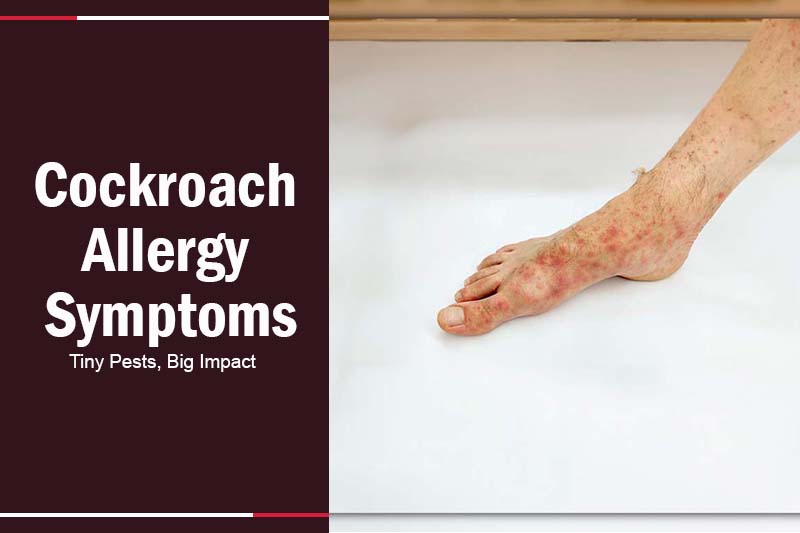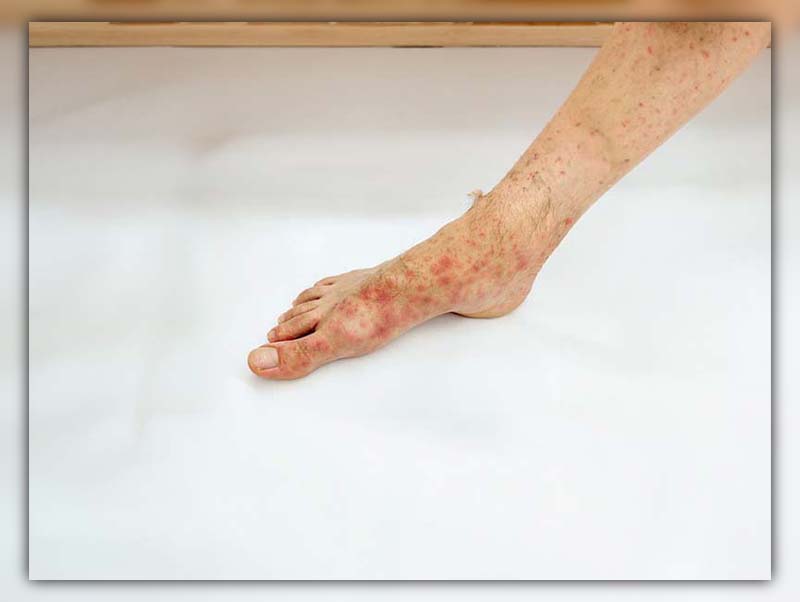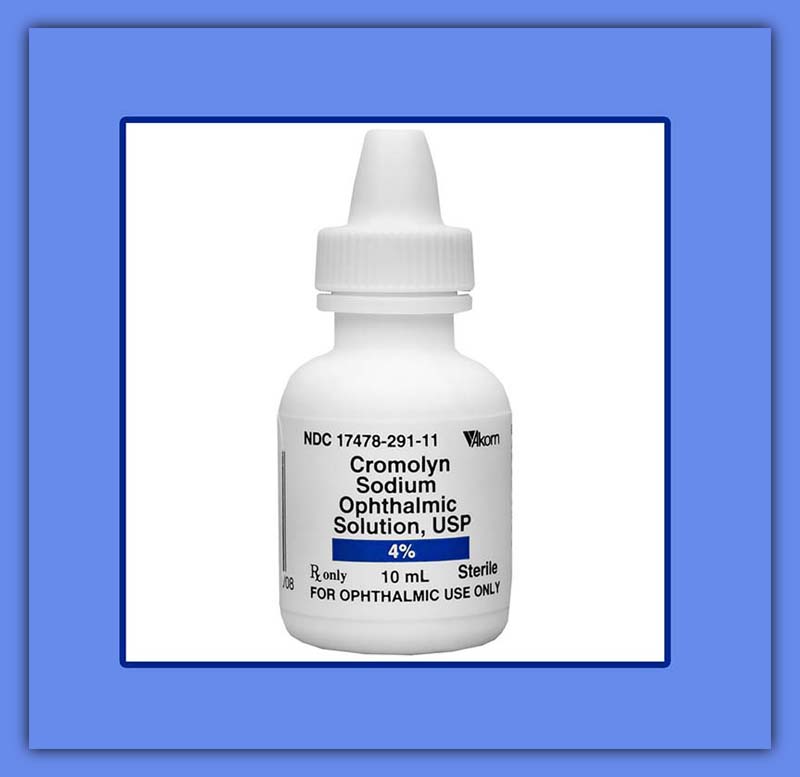Ever sneezed more than usual lately or found your eyes unusually itchy?
Wondering what’s behind that persistent nasal congestion?
You might be overlooking a tiny culprit lurking in your home’s shadows: the cockroach.
Dive into our blog to uncover the lesser-known world of “Cockroach Allergy Symptoms“.

Cockroach Allergy Symptoms
Exposure to cockroaches can lead to allergic reactions in some individuals.
What are the symptoms of cockroach allergy? Here are typical signs of a cockroach allergy:
- Persistent coughs and sneezes.
- Stuffy or dripping noses.
- Eyes that itch and tear up.
- Tingles or itchiness in the mouth, nose, throat, or on the skin.
- Cockroach allergy skin rash: Skin irritations or outbreaks like eczema.
- Mucus trickling down the back of your throat.
- Complications in the nasal passages or sinuses.
- Issues in the ears, like infections.
For those with asthma, the presence of a cockroach allergy might amplify or set off asthma-related symptoms. These can encompass:
- A wheezing sound during breathing.
- Challenges in catching one’s breath or feeling breathless.
- A sensation of tightness or discomfort in the chest.
- Sleep disruptions due to the aforementioned issues.
>> Read more: Do roaches crawl in your ears: A Horror Story That Could Happen to You.
What Is a Cockroach Allergy?
Cockroaches have a particular protein which, for numerous people, serves as an allergen. This can be identified through a cockroach allergy test.
In simpler terms, an allergen is a substance that prompts our body to respond in an allergic way.
Interestingly, it’s not just the roach as a whole, but also its various bits and pieces, its saliva, and even its waste that can tick off our immune system.
Some individuals might have a cockroach IgE allergy.
And here’s a quirky fact: even a cockroach that’s no longer scurrying around can set off these reactions!
How Common is Cockroach Allergy?
How does cockroach allergy happen?
Believe it or not, cockroach allergies rank high on the list of frequent triggers for year-round allergy and asthma episodes.
When we peek at global stats, we find that allergies due to cockroach mix allergy are among the most prevalent indoor sensitivities.
These allergies don’t discriminate between age groups, but it’s noteworthy that the young ones tend to be more vulnerable.
Now, here’s a fact that might surprise you: The National Pest Management Association has observed that a whopping 63% of American homes harbor cockroach allergens.
In urban settings? That figure jumps dramatically, ranging from 78% to an astounding 98%.
>> Read more: Cockroach sound? Decoding Roach Noises.
How to limit exposure to Cockroaches?
Interestingly, some people have even reported cockroach allergy coffee reactions, meaning that cockroaches might contaminate their coffee supplies!
Cockroaches, and their rather unpleasant droppings, are unwelcome visitors we’d all like to avoid.
To ensure they don’t see your home as an ideal spot, it’s essential to understand that these pests crave three things: nourishment, hydration, and a cozy hideout.
With this in mind, here are some steps to reduce their presence:
- Always keep garbage cans securely covered.
- Adopt the habit of using sealed containers for storing food, be it on the kitchen counter or inside cabinets.
- Procrastinating on those dirty dishes? Think again! Leaving them out can be an open invitation for roaches.
- Keep your spaces crumb-free. This means regularly cleaning countertops, tables, stovetops, and floors.
- Spill something? Address it immediately. A clean floor is far less enticing.
- If you have pets, ensure their food doesn’t sit out for long. And just like your dishes, keep pet bowls clean.
- Moist areas are a cockroach’s dream. Address any dripping pipes, especially in basements and under sinks.
- Ensure your home’s exterior is fortified. Seal any cracks or crevices that might serve as entry points.
- Though baits and traps can be effective against cockroaches, it’s wise to steer clear of sprays. They can sometimes trigger allergic reactions or asthma symptoms.
How To Support The Treatment Of Roach Allergy?
The primary approach? Evade cockroaches to the best of your ability.
By curtailing contact with these critters, you can significantly decrease related symptoms.
Nevertheless, at times, medical intervention might be required to keep those pesky symptoms in check.
Here’s a brief on some remedies that can be considered:
- Antihistamines: Accessible as tablets, syrups, or nasal sprays, these wonders can curb symptoms like sneezing and nose or eye itchiness. They’re particularly adept at treating runny noses and, to some extent, nasal blockage.
- Nasal corticosteroids: Found in the form of nose sprays, these reduce nasal inflammation and stave off allergic outbursts. Celebrated for their efficacy, they tackle a broad spectrum of symptoms, notably nasal congestion. Plus, they’re generally gentle with minimal side effects.
>> Read more: How to kill american cockroach: Expert Home Hacks.
- Leukotriene receptor antagonists: These champs counteract specific chemical messengers, other than histamine, that pitch in during allergic responses.
- Cromolyn sodium: A nose spray variant that obstructs the dispersal of allergy-causing chemicals, such as histamines and leukotrienes. It’s a mild option, but remember, it’s typically used four times daily.
- Decongestants: Available in an array of forms – tablets, syrups, or nasal sprays/drops. Their forte? Reducing nasal passage swelling. However, nasal variants should be short-term allies. The oral versions might stir side effects like insomnia or elevated blood pressure for some. A chat with your doctor before diving in is always a good idea.
Conclusion
We’ve ventured deep into the intricacies of “Cockroach Allergy Symptoms” and how such small creatures can leave a significant mark on our health.
Recognizing these symptoms is paramount in leading a more comfortable, pest-free life. Hungry for more insights on the world of pests? Dive deeper with our array of informative blogs on Pestweek.

Calina Mabel has over 15 years of experience in the field of journalism and communications. Currently, Calina Mabel is the Content Writer for categories such as Cockroach, Ants, Bed Bugs, Mosquito, Rodent, Termite, and Flies on Pestweek.com. She aims to build content for these categories with a focus on providing valuable and accessible information to readers, in order to create the world’s largest knowledge community about Pests.
All content written by Calina Mabel has been reviewed by Emily Carter.




